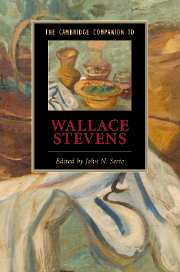Book contents
- Frontmatter
- Introduction
- 1 Wallace Stevens: A Likeness
- 2 Stevens and Harmonium
- 3 Stevens in the 1930s
- 4 Stevens and the supreme fiction
- 5 Stevens’ late poetry
- 6 Stevens and his contemporaries
- 7 Stevens and romanticism
- 8 Stevens and philosophy
- 9 Stevens’ seasonal cycles
- 10 Stevens and the lyric speaker
- 11 Stevens and linguistic structure
- 12 Stevens and painting
- 13 Stevens and the feminine
- 14 Stevens and belief
- Further reading
- Index
8 - Stevens and philosophy
Published online by Cambridge University Press: 28 May 2007
- Frontmatter
- Introduction
- 1 Wallace Stevens: A Likeness
- 2 Stevens and Harmonium
- 3 Stevens in the 1930s
- 4 Stevens and the supreme fiction
- 5 Stevens’ late poetry
- 6 Stevens and his contemporaries
- 7 Stevens and romanticism
- 8 Stevens and philosophy
- 9 Stevens’ seasonal cycles
- 10 Stevens and the lyric speaker
- 11 Stevens and linguistic structure
- 12 Stevens and painting
- 13 Stevens and the feminine
- 14 Stevens and belief
- Further reading
- Index
Summary
Among the great modernist poets in English, it is T. S. Eliot who, on the face of it, can lay most claim to being a philosophical poet. After all, Eliot is the only poet of his generation to have enjoyed an extensive academic training in philosophy. He even wrote a doctoral dissertation in the field. Yet, in spite of this professional training and its patent influence on especially his late masterwork, Four Quartets, it is not Eliot who has gone down in history as the most philosophical of modernist poets in English. That honor has been bestowed on another Harvard student from around the turn of the twentieth century: Wallace Stevens.
This may seem strange to anyone who still associates the name of Stevens with that of a reclusive lawyer working in the insurance industry and a playful, dandy-like poet indulging in the most sophisticated verbal jugglery. The claim to fame becomes even stranger if one takes a quick look at this poet's collection of aphorisms, “Adagia,” only to come across antagonizing proclamations of the following sort: “The poet must not adapt his experience to that of the philosopher” (909). Or, more provocatively still: “Perhaps it is of more value to infuriate philosophers than to go along with them” (906). In a letter of 1951 to the young scholar Bernard Heringman, Stevens can be seen to mount the same warhorse when he goes on to claim, “I have never studied systematic philosophy and should be bored to death at the mere thought of doing so” (L 636). So how could this man be considered the most philosophical among modernist poets in English?
- Type
- Chapter
- Information
- The Cambridge Companion to Wallace Stevens , pp. 103 - 117Publisher: Cambridge University PressPrint publication year: 2007
- 4
- Cited by

